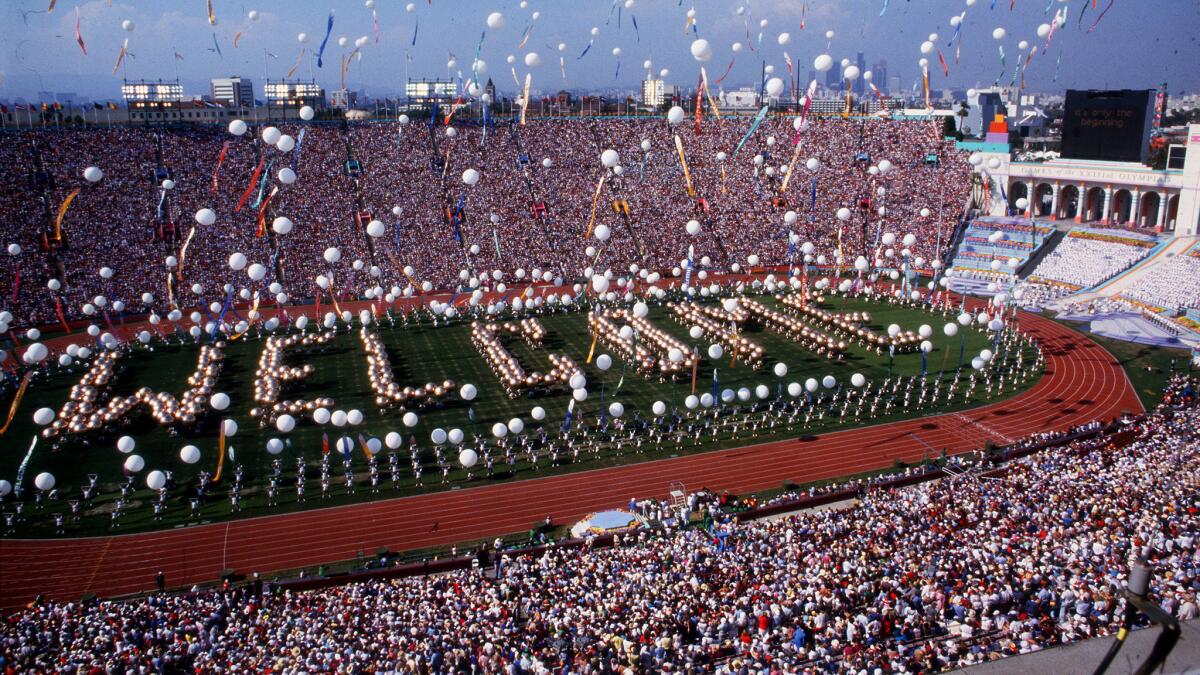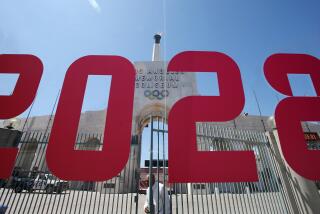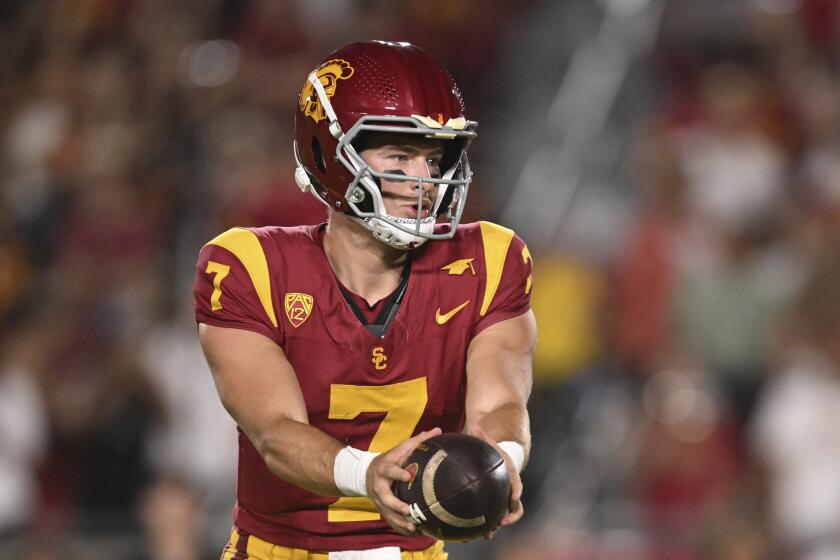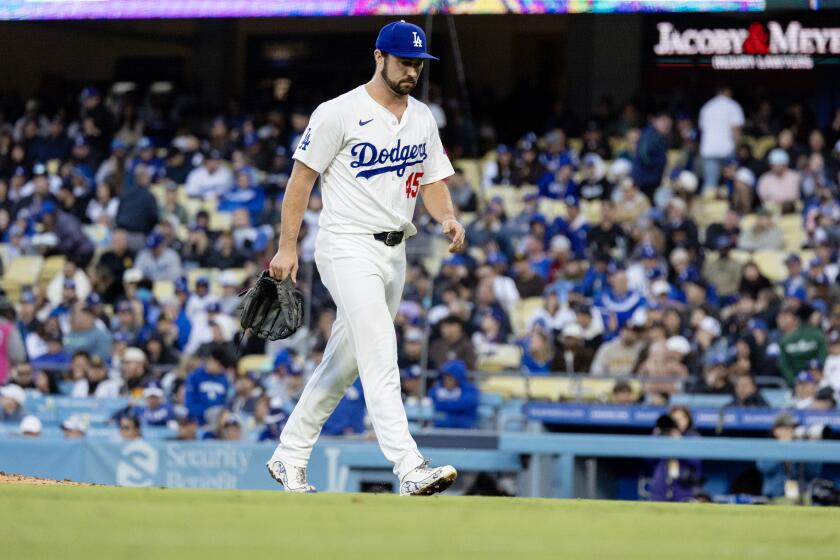Column: L.A. Summer Games were a risk that is still paying off

Nobody wanted the 1984 Summer Olympics except Los Angeles and nobody here wanted to pay for them with public money, so Peter Ueberroth and the organizing committee he led had to drum up private donations and work without the safety net of government guarantees.
They counted heavily on television rights fees and courted corporate sponsors with promises of exclusivity and wide exposure, a controversial strategy. To keep costs down they built only two venues, adapting the rest and dressing them up in touches of hot magenta, chrome green and other shades that would pop on TV.
The use of bright colors and distinctive graphics such as the star-in-motion logo was called “festive federalism” by designer Sussman/Prejza and architecture firm The Jerde Partnership, and it created a fresh, upbeat atmosphere at a time the future of the Olympics had been clouded by years of mismanagement and misfortune.
The 1968 Mexico City Games had been preceded by a government massacre of students. The murder of 11 Israeli athletes turned the 1972 Munich Games into a tragedy. The 1976 Montreal Games had spawned crippling debt. And after President Jimmy Carter ordered a U.S. boycott of the 1980 Moscow Games, the Soviets and some allies shunned Los Angeles and predicted doom.
“They were the riskiest of all Games,” said Anita DeFrantz, a vice president of the L.A. organizing committee and now a member of the International Olympic Committee’s executive board.
It’s easy to forget that now, but it’s a gamble that’s still paying off. The 1984 L.A. Games — which opened 30 years ago Monday with a David Wolper-directed extravaganza at the Coliseum that featured 84 baby grand pianos and a cast of thousands — became the gift that keeps giving.
For nearly three decades the $225-million surplus generated by the L.A. Games has supported elite athletes and those who play purely for fun. The U.S. Olympic Endowment, which is independent of the U.S. Olympic Committee, uses its 40% share of the surplus to support Americans’ Olympic endeavors.
“It’s the largest funding source for our athletes to go to the Games in Brazil,” Ueberroth said, referring to the 2016 Summer Olympics.
The LA84 Foundation, which got $93 million, has provided equipment, coaching instruction and facility upgrades to more than 3 million kids and 1,100 youth sports organizations. Wise investments have allowed the foundation to put $220 million into the community and maintain an authoritative Olympic library at its West Adams headquarters. DeFrantz is its president.
On Monday, LA84 announced a $10.5-million renovation of the John Ferraro Athletic Fields, a soccer complex named for the late L.A. City Council president who helped bring the Games here. LA84 and the city of Los Angeles each contributed $1 million and more donations are being sought.
Other Games left pleasant memories, semi-useful buildings and debts. The 1984 L.A. Games left much, much more.
“I don’t think any will have been able to say they did what happened from these Games,” DeFrantz said. “I know that after these Games, our successors tried to do everything we did …There wasn’t the kind of legacy that continued to give to sport and support.”
The Soviet boycott was the biggest shadow hanging over the L.A. Games. Organizers feared the absence of those nations would hurt television ratings, and lower ratings would have meant less money in rights fees from ABC.
Still, most of the problems leading up to the opening ceremony were minor. DeFrantz, vice president of the Olympic villages, had faced down a delegation that demanded single rooms for its athletes, told athletes to stop training on invitingly empty freeways, and solved the mystery of the missing kimchi.
“We had foolishly been putting it out just for dinner and we learned folks like to have it with every meal,” she said of the Korean dish served at dining halls. “Once we figured that out, it stopped disappearing because we started presenting it at every meal.”
On the eve of the ceremony the tide seemed to be turning in a positive direction.
“I could feel the change in the sentiment of the people of Los Angeles from what had been very negative for four years to a wonderment that this might all work out,” Ueberroth said.
“And I was fascinated, worried. But at the headquarters that I maintained, where anything negative would go, the list of items wasn’t as substantial as I thought they were going to be.”
He was concerned about the reception for China, whose first full Olympic participation was a coup for him and his strategy of appointing special envoys to work closely with participating nations. He also wondered how the crowd would greet Romania, which had bucked the Soviet boycott.
He need not have worried. The Romanians got a standing ovation at a glitzy ceremony that launched two-plus memorable weeks.
“The Olympics the Soviets tried to strangle in their crib are crawling and walking and talking,” Times columnist Jim Murray wrote.
The Games soared and earned healthy TV ratings, fueled by Mary Lou Retton’s gold-medal tumbling, Greg Louganis’ spectacular diving, and the first women’s Olympic marathon. A crowd of 7,500 showed up for a cycling team trial on the Artesia Freeway, and 101,799 crammed into the Rose Bowl for the soccer final between France and Brazil. Ueberroth’s plan of appointing commissioners at each venue worked beautifully, minimizing problems and confusion.
The biggest test, though, was “Black Friday,” the first Friday of the Games and a day 19 venues were in action. “Johnny Carson said the gridlock would be so bad that all the automobile manufacturers could do their fixing up of cars on recalls all at once because they’d all be stalled on the L.A. freeways,” Ueberroth said.
Those doomsday predictions never came true, thanks in part to unions agreeing to delay deliveries of goods until evening hours and to workers changing their hours to receive those deliveries. In budgeting for the Games, Ueberroth had to plan for the cost of calling up the National Guard in case a terrorist incident occurred. Instead of the worst-case scenario he got the best from all involved.
“There were so many things that could go right, so many things that could go wrong,” said Ueberroth, who became commissioner of major league baseball soon after the Games and head of the USOC in 2004. He led the USOC through the 2008 Beijing Games, in part to repay China for its L.A. participation.
“We divided up the Games into enough pieces,” he said, “and we had enough people that owned their piece of the Olympic Games.”
The Southern California Committee for the Olympic Games has tried several times to bring the Games back and a new group is vying to be the U.S. candidate for the 2024 Olympics and Paralympics. Ueberroth, a busy businessman at 76, isn’t involved in that effort.
“Nor should I be,” he said during an interview in his Orange County office. “It’s next generations that should carry this on.”
Those generations will find it difficult to match the gift that began giving 30 years ago and will give for years to come.
Twitter: @helenenothelen
More to Read
Get our high school sports newsletter
Prep Rally is devoted to the SoCal high school sports experience, bringing you scores, stories and a behind-the-scenes look at what makes prep sports so popular.
You may occasionally receive promotional content from the Los Angeles Times.







